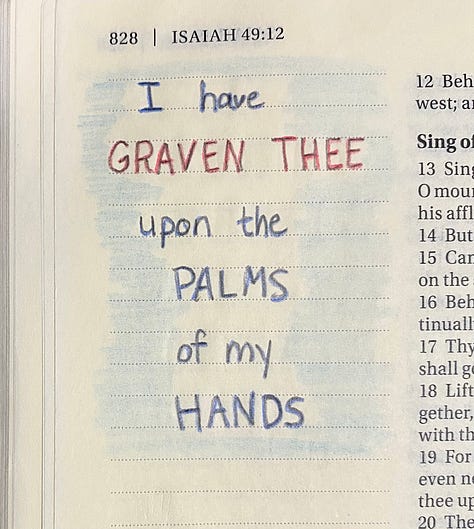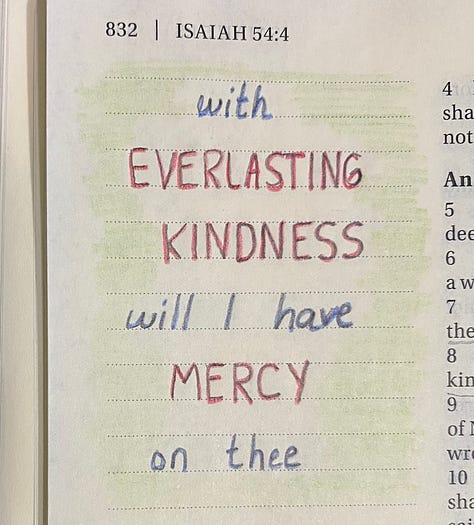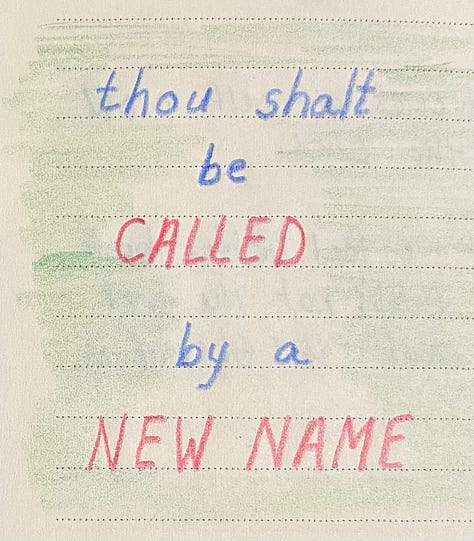On being creative
and a canned speech from Leah
If you ever want to get called out on anything and everything, have children, teach them to think well, then wait until they are adults. You can’t get away with anything.
When our kids were very young and we went on road trips in the big ole brown Ford van, we were so broke there was no stopping for snacks. I brought some food with us and they each had a water bottle, but we were not going into Sheetz to load up on Combos and five-dollar bags of mini Chips Ahoy cookies.
Ben, however, has a penchant for Tastykake donuts—the chocolate covered kind that come in little packages of six. And—at least back then—he could not drive without coffee.
So we would stop at a Pilot and everyone would go in to use the restrooms. Ben would pump the gas, then as we were all coming out, he would go in to get his coffee and a pack of donuts, which he hid stealthily under his jacket, or so he thought.
We would get back on the road and he would wait until the children were occupied reading or playing the states-and-capitals game with the old Rand McNally atlas we kept under the seat, and he would very slowly and quietly open his donuts.
It did not take the children long to figure out this habit, and invariably one of them would ask, “What’s that crinkling up there?” as if we all didn’t know the answer.
As I said, you can’t get away with anything.
Now the children are all grown up with spouses and careers and lives of their own, and eating donuts on a road trip is easy. Too easy, if you ask me. It seems the fun has almost completely gone out of it. But empty-nest reminiscing is not my point here.
I wrote a piece a couple of weeks ago in which I bemoaned my ongoing sickness and referred to myself in this state as “very non-creative.” I should have known better.
My daughter Leah is an avid reader of mine. She may have been my very first subscriber, and she is the one who has been kindly nudging me to write a book for a long time. She is also a creative. She has played violin since age nine, and has spent years teaching orchestra to middle-school students, who she says are the actual best. She writes well and is the person I call for fashion advice, and she is also learning a lot about decorating on a budget. She embraces her creativity, so it’s not surprising to me that she has a lot to say about being creative.
Here is the text she sent me:
This is my canned speech about creativity that I give my students:
Creativity is a byproduct of safety, and it is at the opposite end of the spectrum from perfection. You can’t cling to perfection and be creative at the same time. You have to choose. Perfect music is pretty and boring. You can make that on a computer, and it’s dead. There’s no humanity in it.
Imperfection is where human creativity flourishes. You have to embrace your own imperfection (and that it’s safe to be imperfect) to get your peak creativity to come out. You ARE creative, because God is creative, and you’re made like him (in his image).
Creativity is like breathing; it’s part of being human. If you don’t feel creative, create something anyway. Bake cookies or crochet a granny square or hang a picture on the wall just because that’s where you want it. What if you don’t like the picture there? You just move it. What if you burn the cookies? Throw them in the trash and make more. None of this is a big deal, but you have to feel safe to make mistakes to get your creativity to come out of its cave. 💛
There’s a lot here we could unpack, but there are a few things that stand out to me:
First, do you know what the very first thing we learn about God in the Bible is?
In the beginning, God created . . . (Genesis 1:1)
It’s that he is a creator. Creative. His first act that is recorded for us is that he created something. He created a bunch of things, and then a few days later he created man in his own image, so guess what . . . we are creative too.
I spent a lot of years insisting I was not creative, but that’s because my inner perfectionist is a bully. Now that I’m learning to put her in a corner, I’m seeing that I can actually create something. It is hard work to keep her in her place, but it’s worth the effort.
Leah says this:
“Imperfection is where human creativity flourishes.”
I thought immediately of David, the man after God’s own heart who committed adultery with Bathsheba and then had her husband Uriah killed. When Nathan the prophet pointed a finger at him and said, “Thou art the man,” David knew he was caught in his sin.
The man after God’s own heart was imperfect. But then, broken and distressed at what he’d done, wallowing in all of his imperfection, he created. He wrote Psalm 51. In part it says:
Have mercy upon me, O God, according to thy lovingkindness: according unto the multitude of thy tender mercies blot out my transgressions.
Wash me throughly from mine iniquity, and cleanse me from my sin.
For I acknowledge my transgressions: and my sin is ever before me.
Against thee, thee only, have I sinned, and done this evil in thy sight: that thou mightest be justified when thou speakest, and be clear when thou judgest.
Behold, thou desirest truth in the inward parts: and in the hidden part thou shalt make me to know wisdom.
Purge me with hyssop, and I shall be clean: wash me, and I shall be whiter than snow.
Make me to hear joy and gladness; that the bones which thou hast broken may rejoice.
Hide thy face from my sins, and blot out all mine iniquities.
Create in me a clean heart, O God; and renew a right spirit within me.
Cast me not away from thy presence; and take not thy holy spirit from me.
Restore unto me the joy of thy salvation; and uphold me with thy free spirit.
David wrote some of the most beautiful poetry the world will ever know. He was a gifted writer, a true creative even at his most broken.
The other thing Leah said that I think is so important is this:
“Creativity is a byproduct of safety . . .”
You can’t create under duress. You must feel safe in your surroundings, with your people, and with your God.
David felt safe with God, even though he’d sinned big-time. He knew he could come before God in repentance and God would not turn him away. He could ask God to wash him throughly, to create in him a clean heart, and God would. Can you imagine David writing this beautiful psalm if he were cowering in fear, hiding from the God whose heart he sought? It wouldn’t have happened.
Part of David’s safety was knowing he had space to express his emotions. Have you ever noticed that David often wrote about big feelings? He felt safe telling God about them and he wrote all the way across the vast spectrum, from the heights of joy (when the ark of the covenant was being returned to Jerusalem and he danced before the Lord with all his might) to the depths of despair (when his son Absalom was killed and all he could do was sob, “My son, my son, Absalom! O, Absalom, my son!). God already knew how David was feeling in each instance, but David expressed it anyway, which is the first step in processing emotion.
I would go so far as to say that creativity IS the expression of emotion. Beautiful music can move us to feel what the composer is feeling. So can a painting or a handmade quilt or a perfectly cooked steak.
So if you think you are not creative, ask yourself why. What is it about your inner thoughts or your environment that keeps you from feeling safe enough to take a risk and make something? When your emotions feel big and bubbling over, try writing down what you feel and why. Bake something. Take a photo that reflects how you feel. Dig in the garden. Get some colored pencils and write verses in the margin of your Bible.



Create something. It doesn’t have to be museum-worthy, but it can be a gift to the one who made you creative.
And remember it is a piece of God that’s inside you.



Great read 😊 I’m doing the same taking a step back and teaching myself to be creative. Leah has some thoughtful words too & give us something to think about. Thank you, until!
What beautiful words - what a blessing to read this morning. Thank you!